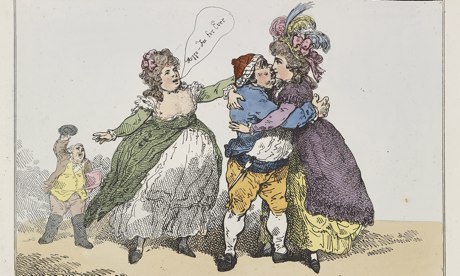Jeremy Bentham's revolutionary views on sex have been kept hidden for too long

Rowlandson's The Devonshire Photograph: Royal Collection Trust
As he lay dying in the spring of 1832, the great philosopher Jeremy Bentham left detailed directions for the preservation of his corpse. First, it was to be publicly dissected in front of an invited audience. Then, the preserved head and skeleton were to be reassembled, clothed, and displayed "in the attitude in which I am sitting when engaged in thought and writing". His desire to be preserved forever was a political statement. As the foremost secular thinker of his time, he wanted to use his body, as he had his mind, to defy religious superstitions and advance real, scientific knowledge. Almost 200 years later, Bentham's "auto-icon" still sits, staring off into space, in the cloisters of University College London.
Nowadays Bentham is hardly a household name. Yet his ideas have proved extraordinarily influential in law, economics, philosophy and politics. Among other things, he was the inventor of the modern doctrine of utilitarianism, the foundational theorist of legal positivism, and the first exponent of cost-benefit analysis. If you've ever weighed up the pros and cons of doing something, you're treading in his footsteps.
In his own time he was celebrated around the globe. Countless practical efforts at social and political reform drew inspiration from him and his disciples (the most famous of whom was John Stuart Mill). From the 1790s on, in Britain, France, Spain, Portugal, Greece and across Latin America, liberal governments and politicians sought his advice and assistance. He was made an honorary citizen of revolutionary France, while the Guatemalan leader José del Valle acclaimed him as "the legislator of the world". Never before or since has the English-speaking world produced a more politically engaged and internationally influential thinker across such a broad range of subjects. The first constitutions of the independent republic of Colombia owed as much to Bentham as do modern theories of animal rights.HT: Marginal Revolution
After his death, the keepers of his memory invariably sought to portray him as a man whose intellect and concern for the public good were so all‑consuming that there had been no place for sexual passion in his life. As Mill put it, "knowing so little of human feelings, he knew still less of the influences by which those feelings are formed": even in his 80s, "he was a boy". Leslie Stephen thought him "all his life both a philosopher and a child … he was not only never in love, but looks as if he never talked to any woman except his cook and housemaid".
This was a travesty of the truth. In his 20s, Bentham fell deeply in love with Polly Dunkley, the orphaned daughter of an Essex doctor. He wanted to marry her, but because she didn't have enough money, his rich and overbearing father prevented it, and after several years their relationship came to an end. Later in life, after his father's death had made him independently wealthy, Bentham loved and proposed marriage to the clever and radical young aristocrat Caroline Fox, niece of the Whig leader Charles James Fox. When the vivacious Irish painter Amelia Curran, a friend of the Shelleys, came to paint Bentham in the early 1810s, the two of them appear to have had some kind of entanglement. And among his surviving manuscripts are some remarkable notes on sexual techniques, toys and positions whose explicitness would have made Mill blush....MORE
We've looked at Bentham a few times, most recently in "Why Didn't Anyone Tell Me The Dessicated Corpse of Jeremy Bentham Attended A Board Meeting At University College London?":

181-year-old corpse of Jeremy Bentham attends UCL board meeting
Many board meetings are so tedious that members often end up looking like waxwork dummies.
But at this gathering, the well-dressed gentleman in the corner can be forgiven for looking a little out of it – Jeremy Bentham died 181 years ago....